A Star is Born (2018)
Lady Gaga, Bradley Cooper, Sam Elliott, Dave Chappelle, Andrew Dice Clay. Written by Eric Roth, Bradley Cooper, Will Fetters. Directed by Bradley Cooper.
 It was seventeen years between Janet Gaynor and Judy Garland, twenty-two years between Garland and Barbra Streisand, and now forty-two years between Streisand and Lady Gaga as the titular star in A Star is Born. I mention this only because I’m thinking about the disconnect I felt with the music in the 1954 version and about how much I enjoyed the music in this 2018 version. Some stories deserve to be retold in ways that connect to their intended audiences, and maybe this is one.
It was seventeen years between Janet Gaynor and Judy Garland, twenty-two years between Garland and Barbra Streisand, and now forty-two years between Streisand and Lady Gaga as the titular star in A Star is Born. I mention this only because I’m thinking about the disconnect I felt with the music in the 1954 version and about how much I enjoyed the music in this 2018 version. Some stories deserve to be retold in ways that connect to their intended audiences, and maybe this is one.
 Some people say once a film has achieved cultural icon status, there’s no point in remaking it, but I’m not one of these people. Art is consumed, but it is also created, and its creation is most often where the magic and beauty are, and if we didn’t all feel this way we would be stuck with one interpretation of Romeo and Juliet and one version of “All Along the Watchtower.” The world would be a poorer place.
Some people say once a film has achieved cultural icon status, there’s no point in remaking it, but I’m not one of these people. Art is consumed, but it is also created, and its creation is most often where the magic and beauty are, and if we didn’t all feel this way we would be stuck with one interpretation of Romeo and Juliet and one version of “All Along the Watchtower.” The world would be a poorer place.
Is the world a richer place with this third remake of A Star is Born? It’s too early to tell, but it’s already spawned one hit single (“Shallow”) and Oscar buzz for its stars. Of the four films, it has the best music and possibly the best acting, and if anyone in the cast wins an acting Oscar it will be a first: Gaynor and Fredric March lost to Louise Rainer and Spencer Tracy. Garland and James Mason lost to Grace Kelly and Marlon Brando (The Country Girl and On the Waterfront—they never had a chance!). Neither Streisand nor Kris Kristofferson were nominated for acting awards, but Streisand did win an Oscar for best song.
 More important, Gaga and Cooper have something different to say in this telling of the tale. There was a hint of a statement in the 1976 film about rock music and pop, but here it seems to be the central theme. This movie is less about a relationship, less about self-destructive personalities, and more about music and success. This may also be its biggest shortcoming, but the shift in emphasis validates a third remake.
More important, Gaga and Cooper have something different to say in this telling of the tale. There was a hint of a statement in the 1976 film about rock music and pop, but here it seems to be the central theme. This movie is less about a relationship, less about self-destructive personalities, and more about music and success. This may also be its biggest shortcoming, but the shift in emphasis validates a third remake.
 Our falling star is now named Jackson Maine and our rising star is Ally Campana, and their meeting is very much like Esther’s meeting John in 1976. Ally’s singing in a drag show when a drunk Jackson stumbles in. Their connection is nearly immediate, and they get to know each other very quickly. Before they’ve been acquainted 48 hours, Jackson practically forces Ally onstage to perform one of her songs. She’s an immediate hit.
Our falling star is now named Jackson Maine and our rising star is Ally Campana, and their meeting is very much like Esther’s meeting John in 1976. Ally’s singing in a drag show when a drunk Jackson stumbles in. Their connection is nearly immediate, and they get to know each other very quickly. Before they’ve been acquainted 48 hours, Jackson practically forces Ally onstage to perform one of her songs. She’s an immediate hit.
The first half of this movie is better than any half of any of its predecessors. Cooper and Gaga are a joy to watch, crackling with chemistry and sincerity. Cooper adopts a Kristofferson-like look and sound, while Gaga is all kinds of humility and sweetness Streisand couldn’t approach (and possibly only Gaynor equaled). Gaga’s music in real life doesn’t do a thing for me; if it moves me at all it moves me out the door. But here in their early scenes, absent the veneer of a pop show with all its choreography, makeup, costumes, and sheen, we have an actress perhaps less skilled than her opposite but making up for it with utter vulnerability.
 Ally on stage is likeable, but her pop music feels fake, and if that weren’t blatant enough a statement, there’s a moment where Jackson offers her a pep talk, saying her audiences will love her if she always effing means what she’s singing.
Ally on stage is likeable, but her pop music feels fake, and if that weren’t blatant enough a statement, there’s a moment where Jackson offers her a pep talk, saying her audiences will love her if she always effing means what she’s singing.
But as Sam Adams wrote in his critique on Slate, “the further from Jackson’s influence Ally gets, the worse her music becomes.” Cooper’s message may not be as overt as Adams interprets it, but there’s so much in the setup about having a voice, having something to say, and trusting others that he’s definitely on to something.
The worsening of Ally’s music doesn’t necessarily dictate a worsening of the story, but it is the case here, and the second half is a letdown after such a promising setup. Still, my fondness for the film is salvaged by a decision Cooper the director makes near the end, giving us something none of the earlier movies offered, making 2018’s A Star is Born the best of the four.
7/10
77/100

 This second remake of A Star is Born is the logical bookend for the collection. In 1937, Janet Gaynor played a rising movie star. In 1954, Judy Garland played a rising star of movie musicals. Now in 1976 Barbra Streisand plays a rising star of pop music, this time as Esther Hoffman instead of Esther Blodgett, with Kris Kristofferson as her alcoholic discoverer, John Norman Howard instead of Norman Maine.
This second remake of A Star is Born is the logical bookend for the collection. In 1937, Janet Gaynor played a rising movie star. In 1954, Judy Garland played a rising star of movie musicals. Now in 1976 Barbra Streisand plays a rising star of pop music, this time as Esther Hoffman instead of Esther Blodgett, with Kris Kristofferson as her alcoholic discoverer, John Norman Howard instead of Norman Maine.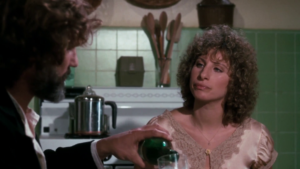 Kristofferson provides the movie something the earlier versions didn’t: a male lead with charisma to tug back against the star. John’s rock-star magnetism and rough road-weariness almost make alcoholism sexy, where in 1937 and 1954 all it did was make men weak. I want to say I disapprove of such representation, but it feels appropriate, and it makes for a much better dynamic.
Kristofferson provides the movie something the earlier versions didn’t: a male lead with charisma to tug back against the star. John’s rock-star magnetism and rough road-weariness almost make alcoholism sexy, where in 1937 and 1954 all it did was make men weak. I want to say I disapprove of such representation, but it feels appropriate, and it makes for a much better dynamic. Esther calls the shots in this relationship from the beginning, and while John nudges her onto the stage for her turn in the spotlight, her success, like the successes of the Esther Blodgetts before her, is entirely hers. A star is born; she isn’t made.
Esther calls the shots in this relationship from the beginning, and while John nudges her onto the stage for her turn in the spotlight, her success, like the successes of the Esther Blodgetts before her, is entirely hers. A star is born; she isn’t made.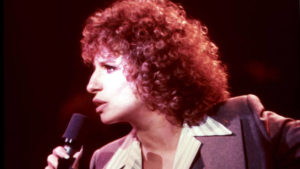 This remake suffers from some of the same period-related stuff as the first remake. It worships Streisand the actress-singer a bit too adoringly and segues twice into that Seventies staple, the golden sunlight country road long drive music video, complete with lens flares. You see the first one coming a mile away, and the second one is only a surprise because who expects that twice?
This remake suffers from some of the same period-related stuff as the first remake. It worships Streisand the actress-singer a bit too adoringly and segues twice into that Seventies staple, the golden sunlight country road long drive music video, complete with lens flares. You see the first one coming a mile away, and the second one is only a surprise because who expects that twice?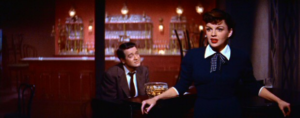 Esther Blodgett is a singer in a band when she meets Norman Maine, a Hollywood star at the very beginning of his career’s decline. Although this 1954 version is my least favorite of the four A Star is Born films, Esther and Norman’s meeting in this one is the best. Norman’s drunk when he wanders onto a stage where Esther and her band are performing. Rather than let Norman be embarrassed, Esther quickly incorporates him into the act, as if he were part of the show.
Esther Blodgett is a singer in a band when she meets Norman Maine, a Hollywood star at the very beginning of his career’s decline. Although this 1954 version is my least favorite of the four A Star is Born films, Esther and Norman’s meeting in this one is the best. Norman’s drunk when he wanders onto a stage where Esther and her band are performing. Rather than let Norman be embarrassed, Esther quickly incorporates him into the act, as if he were part of the show.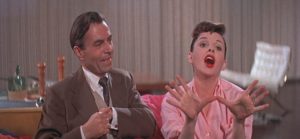 It’s an immediate display of grace, sensitivity, talent, smarts, and self-assuredness that characterizes Esther throughout the film. If only such economy in development could be employed the rest of the way.
It’s an immediate display of grace, sensitivity, talent, smarts, and self-assuredness that characterizes Esther throughout the film. If only such economy in development could be employed the rest of the way.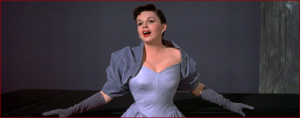 Take out most of the songs, and the film would be a pleasant length, but the filmmakers are determined to make it a comeback tour de force for Garland, who’d been out of movies for four years following the end of her time with MGM.
Take out most of the songs, and the film would be a pleasant length, but the filmmakers are determined to make it a comeback tour de force for Garland, who’d been out of movies for four years following the end of her time with MGM.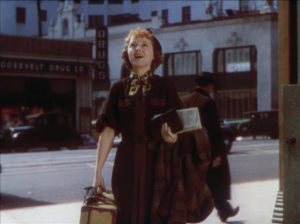 Esther Blodgett is a North Dakota farm girl with dreams of Hollywood stardom. The original A Star is Born movie pretty much begins with her family thinking she’s crazy for even entertaining the notion. Her grandma, however, believes that if you’re willing to risk everything in pursuit of your goals, you have to do it.
Esther Blodgett is a North Dakota farm girl with dreams of Hollywood stardom. The original A Star is Born movie pretty much begins with her family thinking she’s crazy for even entertaining the notion. Her grandma, however, believes that if you’re willing to risk everything in pursuit of your goals, you have to do it.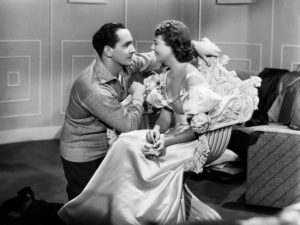 The Esther-Norman relationship drives the film, because while Esther may have needed Norman’s little boost to get through the door, she’s not at all dependent or needy in her relationship with Norman or in any other relationship. Norman clearly needs her far more than she needs him. She just really, really loves him, and he doesn’t quite know how to be loved.
The Esther-Norman relationship drives the film, because while Esther may have needed Norman’s little boost to get through the door, she’s not at all dependent or needy in her relationship with Norman or in any other relationship. Norman clearly needs her far more than she needs him. She just really, really loves him, and he doesn’t quite know how to be loved.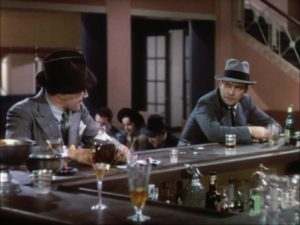 In nearly every way, A Star is Born looks and feels like the popular movies of its time, but with a smart, strong woman taking the lead. Norman is no tragic hero—he’s not a hero at all—but he’s a man loved by a woman. Could his demise have been reversed by a woman like this, or by anyone? The film seems to think not, and as Norman travels along his beautiful, downward spiral, Esther goes along with him because someone has to try.
In nearly every way, A Star is Born looks and feels like the popular movies of its time, but with a smart, strong woman taking the lead. Norman is no tragic hero—he’s not a hero at all—but he’s a man loved by a woman. Could his demise have been reversed by a woman like this, or by anyone? The film seems to think not, and as Norman travels along his beautiful, downward spiral, Esther goes along with him because someone has to try. Kayla is in the last week of eighth grade, where she’s pretty close to invisible and doesn’t seem to have any close friends. Her classmates vote her “Most Quiet,” which bugs Kayla. She doesn’t think of herself as quiet; she doesn’t want to be quiet. She has things to say, but she can’t seem to interest anyone in hearing her.
Kayla is in the last week of eighth grade, where she’s pretty close to invisible and doesn’t seem to have any close friends. Her classmates vote her “Most Quiet,” which bugs Kayla. She doesn’t think of herself as quiet; she doesn’t want to be quiet. She has things to say, but she can’t seem to interest anyone in hearing her. Because most of us were eighth-graders millions of years ago, we’re like Kayla’s dad. We see what a bright, interesting, resilient young woman Kayla is. Unlike Kayla, we also see that the young people around her, the popular kids throwing pool parties at their huge homes and the nerdy cousins and the handsome (barely pubescent) jocks all have their own growing pains.
Because most of us were eighth-graders millions of years ago, we’re like Kayla’s dad. We see what a bright, interesting, resilient young woman Kayla is. Unlike Kayla, we also see that the young people around her, the popular kids throwing pool parties at their huge homes and the nerdy cousins and the handsome (barely pubescent) jocks all have their own growing pains. Kayla takes a foray or two into the world of grownups (read: high-schoolers) where she sort-of experiences the kind of acceptance she longs for. I don’t know what such excursions were like for anyone else, but I imagine Kayla doesn’t see anything especially unusual.
Kayla takes a foray or two into the world of grownups (read: high-schoolers) where she sort-of experiences the kind of acceptance she longs for. I don’t know what such excursions were like for anyone else, but I imagine Kayla doesn’t see anything especially unusual.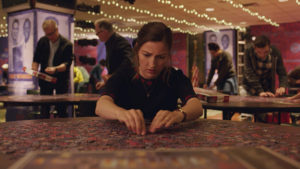 People who know me don’t have to be told I’m predisposed toward liking a movie about a middle-aged homemaker questioning her choices and discovering a love for solving jigsaw puzzles. It’s like this movie was made for me, so take my recommendation with this in mind.
People who know me don’t have to be told I’m predisposed toward liking a movie about a middle-aged homemaker questioning her choices and discovering a love for solving jigsaw puzzles. It’s like this movie was made for me, so take my recommendation with this in mind. A day after a birthday party thrown for Agnes which she seems to have done all the prepping for and cleaning up after, Agnes takes a few moments for herself, apparently a rare occurrence. One friend has given her a jigsaw puzzle as a birthday gift. She spends the day completing it, and then breaking it apart so she can complete it again.
A day after a birthday party thrown for Agnes which she seems to have done all the prepping for and cleaning up after, Agnes takes a few moments for herself, apparently a rare occurrence. One friend has given her a jigsaw puzzle as a birthday gift. She spends the day completing it, and then breaking it apart so she can complete it again.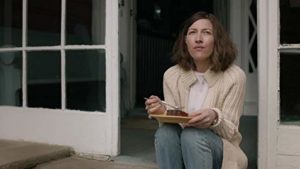 Soon, she is secretly practicing a few times a week with a new puzzle-solving partner—an independently wealthy inventor, recently single, who watches the news all day because he’s fascinated by the destruction.
Soon, she is secretly practicing a few times a week with a new puzzle-solving partner—an independently wealthy inventor, recently single, who watches the news all day because he’s fascinated by the destruction. The Spy Who Dumped Me is not the first female buddy-cop flick, but in the summer of 2018, its existence and moderate success feel like a statement. I was happy to see it just to express my support for such a film, and in fact am disappointed in the title, which refers to a male character who’s pretty much not even in the movie. This is a movie about two friends, not a man who dumps a woman.
The Spy Who Dumped Me is not the first female buddy-cop flick, but in the summer of 2018, its existence and moderate success feel like a statement. I was happy to see it just to express my support for such a film, and in fact am disappointed in the title, which refers to a male character who’s pretty much not even in the movie. This is a movie about two friends, not a man who dumps a woman.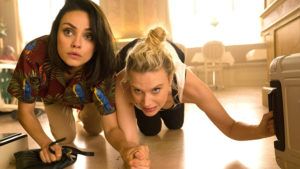 I didn’t care for the violence, which seems to push past gratuitous and into sadistic, and I mean sadistic toward its audience. People come to horrific ends, almost always men and almost always after establishing some kind of rapport with the main characters. Is this also part of the big statement? If it is, there’s probably more going on here than I thought.
I didn’t care for the violence, which seems to push past gratuitous and into sadistic, and I mean sadistic toward its audience. People come to horrific ends, almost always men and almost always after establishing some kind of rapport with the main characters. Is this also part of the big statement? If it is, there’s probably more going on here than I thought. These two younger women are vapid and giggly. Are Audrey and Morgan looking at their former selves, kind of disgusted with what they see but experienced enough to manipulate it? Or are they looking at the idea of young women in movies, nearly completely useless in a genre almost always dominated by men?
These two younger women are vapid and giggly. Are Audrey and Morgan looking at their former selves, kind of disgusted with what they see but experienced enough to manipulate it? Or are they looking at the idea of young women in movies, nearly completely useless in a genre almost always dominated by men?